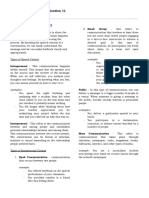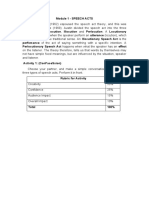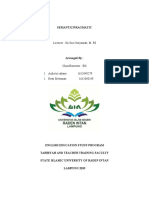Module 7
Uploaded by
Darlene Dale LapingModule 7
Uploaded by
Darlene Dale LapingTOPIC: Speech Act
LEARNING COMPETENCY: Responds appropriately
and effectively to a speech act
CONTENT STANDARD: The learner recognizes that
communicative competence requires understanding
of speech context, speech style, speech act, and
communicative strategy.
PERFORMANCE STANDARD: The learner
demonstrates effective use of communicative strategy
in a variety of a speech situation.
This module Types of Speech Act was designed to
make you better understands the following:
A. Types of Speech Act;
B. Locution (Utterance);
C. Illocution (Intention); and
D. Perlocution (Response).
After going through this module, you are expected to:
1. define speech acts;
2. distinguish types of speech act; and
3. determine the appropriate response in different
social setting; and
4. response appropriately and effectively to a speech
act.
PRE-TEST
LESSON 1: Types of Speech Acts
when I got home.” Speech acts require not only the
knowledge of the language but also the appropriate
use of language in a given context. One can say that
speech acts are an important aspect of
communication.
As we communicate with others, we use language
without minding whether to use complete sentence
or not. The number of words in a single utterance
does not matter so long as we can get our message
across.
Locutionary Acts
Locutionary acts are, according to Susana Nuccetell
and from Gary Seay (from Philosophy of Language:
The Central Topics) 2007, “the mere act of producing
some linguistic sounds or marks with a certain
meaning and reference.". Locutionary act refers to
any utterances that may contain statements or words
about objects. It may be a word, or even a phrase that
has a meaning.
For example: “It is raining.” “My teacher is wearing a
Definition:
In linguistics (the scientific study of language), a
speech act is an utterance (an utterance is a unit of
speech) that serves a function in communication.
red dress today.” “I love dogs.”
Speech Acts are actions done by saying them. The
listener must first determine the type of act being
performed before he can determine which way a
Illocutionary Acts
speech act is to be interpreted.
Illocutionary act is the acting part of the speech act. It
Speech Act is an utterance that a speaker makes to
carries a directive for the audience. It may be a
achieve an intended effect.
command, an apology, an expression of thankfulness
or just an answer to a question for the information of
It is the action that the speaker wants to provoke in
other people in the communication process.
his/her listener’s thoughts. People perform speech
acts when they want to express an apology, greeting,
There are two kinds of illocutionary acts. The first is
request, compliment, invitation, complaint, warning,
called constantive, or making something true or false
promise, refusal, or declaration. A speech act may
by saying it. This is commonly done by someone in
contain a word like “Sorry” to express an apology like
authority like a judge or an official.
in the sentence, “I am so sorry for not calling you
1. Assertive – a type of illocutionary act in which the
Examples: I name this dog Chubby. You are free to speaker expresses belief about the truth of a
leave. You are not my friend anymore. The meeting is proposition like boasting, suggesting, asserting,
adjourned. concluding, and swearing
The second is doing something by just saying it. It is Example: I am still the best student in class.
also called performative. No one can love you better than I do.
Examples: I nominate Lancer for president. I accept 2. Directive – a type of illocutionary act in which the
the challenge. I promise to take care of you as long as speaker tries to make the addressee perform an
I live. I challenge you to prove me wrong. You are action by way of commanding, requesting, begging,
invited to my birthday celebration. inviting, pleading, or insisting
Example: Take me to that place.
Perlocutionary Acts Please maintain the cleanliness of our
school.
3. Commissive – a type of illocutionary act which
commits the speaker to future actions such as
promising, planning, vowing, and betting
Example: I will take you to school every day starting
tomorrow.
From this moment on, I will love you and
Perlocutionary act is the third aspect of speech acts. It honor you for the rest of my life.
is a speech act that produces an effect, intended or
not, achieved in an addressee by a speaker’s 4. Expressive – a type of illocutionary act in which the
utterance. Perlocutionary act can bring about a speaker expresses his/her feelings or emotional
consequence to the audience. They have an effect to reactions. Some examples of expressive acts are
the listener in feelings, thoughts, or actions such as thanking, apologizing, welcoming, and deploring
changing someone’s mind. Unlike illocutionary act,
perlocutionary act can project a sense of fear in the Example: I am so sorry for not wearing the complete
audience. uniform today.
Thanks heavens, you came to same me! I owe you my
Consider the following utterance, “By the way, I have life.
a CD of Debussy. Would you like to borrow it?” Its
illocutionary function is an offer, while its intended 5. Declarative – a type of illocutionary act which
perlocutionary effect might be to impress the listener, brings a change in an external situation. Simply put,
or to show a friendly attitude, or to encourage declarations bring into existence, or cause the state of
interest in a particular type of music. affairs which they refer to. Some examples of
declarations are blessing, firing, baptizing, and bidding
Example: You are fired!
By saying that someone is hired, an employee causes
or brings about the person's acceptance to job:
consequently, this changes his external situation.
ASSIGNMENT:
Illocutionary acts can be categorized into common
families of speech acts. The following is John Searle’s
categories of illocutionary acts. Each has its own
illocutionary purpose.
One Earth is an environmental short film I created and
edited to help raise awareness about our impact on
our environment day to day.
It tells the story of how we globally, and massively
around the world, use resources for our short term
profit, by deforestation, mining, burning fossil fuels,
consuming and expanding. This sadly leads to the
many environmental issues we face today in 2021,
including global pollution, climate change, and the
extinction of animal species.
You might also like
- First Midterm Examination in Oral Communication 11No ratings yetFirst Midterm Examination in Oral Communication 116 pages
- Communicative Competence Strategies in Various Speech Situations CONTENT STANDARD: The LearnerNo ratings yetCommunicative Competence Strategies in Various Speech Situations CONTENT STANDARD: The Learner7 pages
- Lesson 5 - DARIA & DE DEMINGO - SPEECH ACT THEORYNo ratings yetLesson 5 - DARIA & DE DEMINGO - SPEECH ACT THEORY4 pages
- Oral Communication11 - Q1 - Module 7 - S.Y. 2021 2022 1No ratings yetOral Communication11 - Q1 - Module 7 - S.Y. 2021 2022 16 pages
- CO - Q1 Oral Comm in Context SHS Module-7-FINAL50% (6)CO - Q1 Oral Comm in Context SHS Module-7-FINAL19 pages
- Maintain Electrical Installation Systems Level 5No ratings yetMaintain Electrical Installation Systems Level 510 pages
- Public Administration Unit-6 Development AdministrationNo ratings yetPublic Administration Unit-6 Development Administration10 pages
- Final Specific Guidelines For 2024 Nfot TechnolympicsNo ratings yetFinal Specific Guidelines For 2024 Nfot Technolympics15 pages
- Assessment - RIIQUA601E - V1.0 - June 2021No ratings yetAssessment - RIIQUA601E - V1.0 - June 20219 pages
- Chapter # 14: International and Culturally Diverse Aspects of LeadershipNo ratings yetChapter # 14: International and Culturally Diverse Aspects of Leadership25 pages
- 1 - Lesson Plan - WESTERN CLASSICAL ART TRADITION (August 22, 2022)No ratings yet1 - Lesson Plan - WESTERN CLASSICAL ART TRADITION (August 22, 2022)12 pages
- Green-Rpms Portfolio New 2022-2023 Teacher KJ ValNo ratings yetGreen-Rpms Portfolio New 2022-2023 Teacher KJ Val33 pages
- Department of Education: Dr. Gerardo Sabal Memorial National High SchoolNo ratings yetDepartment of Education: Dr. Gerardo Sabal Memorial National High School5 pages
- Tubby Bye-Bye - Teletubbies Wiki - FandomNo ratings yetTubby Bye-Bye - Teletubbies Wiki - Fandom14 pages
- First Midterm Examination in Oral Communication 11First Midterm Examination in Oral Communication 11
- Communicative Competence Strategies in Various Speech Situations CONTENT STANDARD: The LearnerCommunicative Competence Strategies in Various Speech Situations CONTENT STANDARD: The Learner
- Oral Communication11 - Q1 - Module 7 - S.Y. 2021 2022 1Oral Communication11 - Q1 - Module 7 - S.Y. 2021 2022 1
- Public Administration Unit-6 Development AdministrationPublic Administration Unit-6 Development Administration
- Final Specific Guidelines For 2024 Nfot TechnolympicsFinal Specific Guidelines For 2024 Nfot Technolympics
- Chapter # 14: International and Culturally Diverse Aspects of LeadershipChapter # 14: International and Culturally Diverse Aspects of Leadership
- 1 - Lesson Plan - WESTERN CLASSICAL ART TRADITION (August 22, 2022)1 - Lesson Plan - WESTERN CLASSICAL ART TRADITION (August 22, 2022)
- Department of Education: Dr. Gerardo Sabal Memorial National High SchoolDepartment of Education: Dr. Gerardo Sabal Memorial National High School

























































































